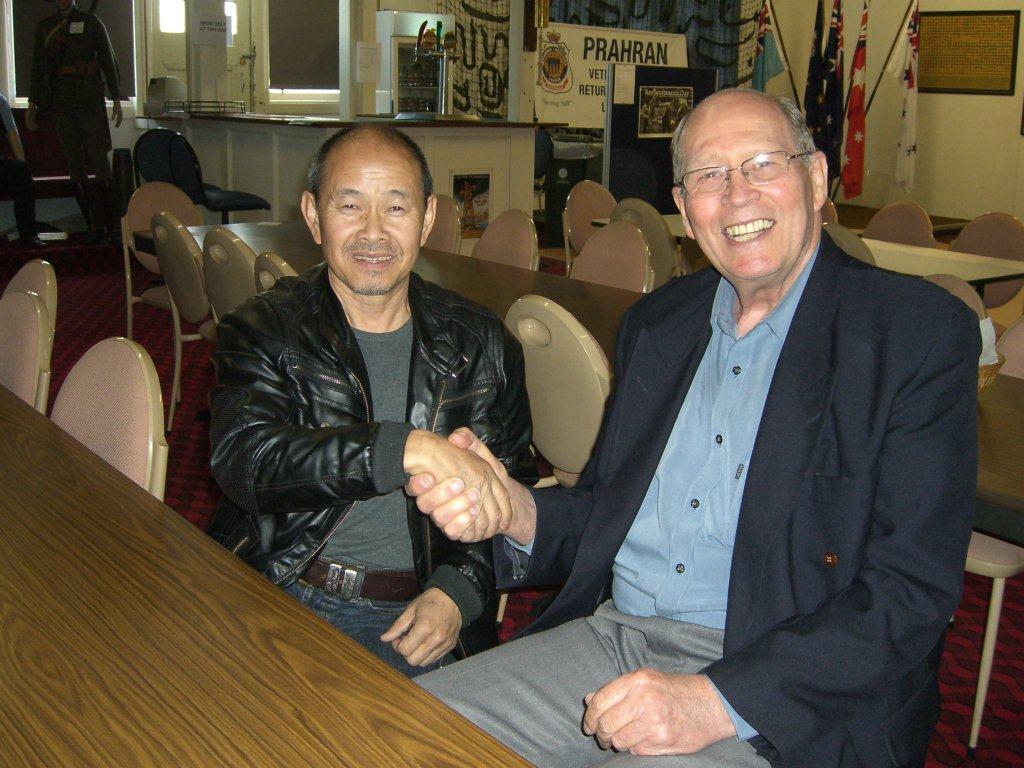When Sandy MacGregor went to Melbourne to talk about MiVAC at the Annual Reunion of the Australian Army Band Corps and at a public talk at the Prahran RSL Club the next day he was fortunate to have two Australian/Lao guys at his talk. One was Mal Vue (Malcolm Nyiaj Vue) who expressed interest in working with MiVAC. His story is fascinating – he is the first of seven Lao Hmong people ever to live in Australia – this was in 1974. I asked him to write a brief extract of his story for MiVAC. Here it is:
I was born to Xai Shoua Vue and Yang Mee Xiong, the first son and second child of twelve children in my family; but I didn’t have the opportunity to know them all. I was born in a little village on the side of a huge mountain; we didn’t have much contact with the outside world until 1969.
As a child growing up in our country, the land provided us with all that we ever needed to survive. My father taught me about survival in the jungle and hunting, while my mother gave me the education of house duty and farming. These were the only tools I ever needed because I was going to be a famer like them.
But my luck changed, because in 1970 War came to our little village. We had visitors being a group of about 8 or 10 men in green clothes who stayed in my grand-father’s house over-night. All the men in our village went to visit them and talked most of the night. Then a few days later my mother and father were talking every night and there were lots of arguments. My father and one of my mother’s brothers decided to join the army.
After a week my mother gave in to my father’s relentless arguments of how good it would be to own some money and how we won’t have to work on the land anymore. I remember the day my father left to join the army. There was a lot of excitement and everyone in the village came to our house to farewell the two men for they long journey.
A year after my father joined the army our village was almost empty as most of the men and young men in our village went to join the army as well. Then everyone moved to the army base. We were the last to leave for the army base, a days walk from my old village. We were only at the army base for a short time before I lost two of my brothers and my niece, while my younger brother and I was wounded. I lost my left leg and my little brother was wounded in the stomach to an unexploded Bazooka shell.
In 1971 the army base was lost to the communists and I ended up being a refugee in my own country. As a refugee I was living in a small village called Nong Dan about 10 kilometres from Paksan in Laos. I was rescued by a Filipinos NGO doctor. This came about due to Patrick Hunt – an Australian. Patrick and his friend were travelling around in search of refugee stories, as they were war journalists. They saw me hopping along the dirt road with one leg on a stick. They took some pictures of me and after getting back to Vientiane they informed the NGO where we were. The Filipinos doctor came to visit us and asked my parents to allow me to go with them to Vientiane so they can fit me with a new leg.
I was having difficulty adapting to my new leg so I spent almost two years in Vientiane with the doctors modifying the leg and exercising my stump. During this time Patrick came to visit me regularly at the hospital and he visited my parents providing feedback of my progress. Patrick and I become friends, and when the doctors completed my new leg I went to stay with Patrick for six months.
In early 1974 the Vietnamese troops starting to appear in Vientiane as the new agreement to stop the war was signed. Everyone knew the war was coming to an end so all the foreigners were leaving Laos. Patrick lost his job and was to leave for his home in Australia. Luckily for me, Patrick brought me with him to visit his family for three months. His intention was to send me back home to Laos after 3 months in Australia.
Patrick’s old company found him a job in Jakarta. I was left with his mother and three sisters in Australia, they didn’t know what to do with me but they couldn’t send me back to Laos as Patrick was in Indonesia. In late January 1975 school was starting; Patrick’s mother called him and was told to send me to school with her younger daughter.
Then in March 1975 Laos was totally under the control of the Communists. After they took control of Laos, the Hmong (who weren’t liked by the Lao people) were being persecuted for helping the Americans. My family had been working for the Americans during the Vietnam War so they were in danger. All the Hmong vanished back to the jungle where they once lived.
The Australian government didn’t know what to do with me – I was being tossed around between Patrick’s mother and the Australian government. I completed my schooling at 17 years of age, just managing to read and write English like a ten old Australian child. I was then told by Patrick’s mother and his sisters that I was too old to live with them and must decide what I wanted to do with my life. I decided to get married and moved out. I was married on 27th December in 1979 and have a son and two daughters – I was divorced in 1997.
After my divorce I continued with my taxi business in Adelaide. In 2005 I entered TAFE and completed a Certificate in Film Making. Then in 2009 I moved to Melbourne to live with my brother who I had sponsored from a refugee camps in Thailand to Australia 1986. In Melbourne I completed a diploma in Community Development in 2010. Today I’m back at school doing a bachelor degree in Local and International Community Development at the Victoria University in Melbourne. I have joined MiVAC (Mine Victims and Clearance) and look forward to going back to Laos on my University assignment as a volunteer fieldwork placement with MiVAC in Phonsavan for a four weeks tour of duty.
Marriage wasn’t on my agenda but my brother tells me, “to stop wasting my life and remarry so that I can fit in with the Hmong community in Australia”. With this in mind in November 2011 I went on a two months holiday to Laos and married a young Hmong lady in Phonsavan. I lodged our application to bring my wife to Australia in March 2012. We’re waiting for the Australian government to provide her with a travel visa so we can be together again.
Malcolm Nyiaj Vue

